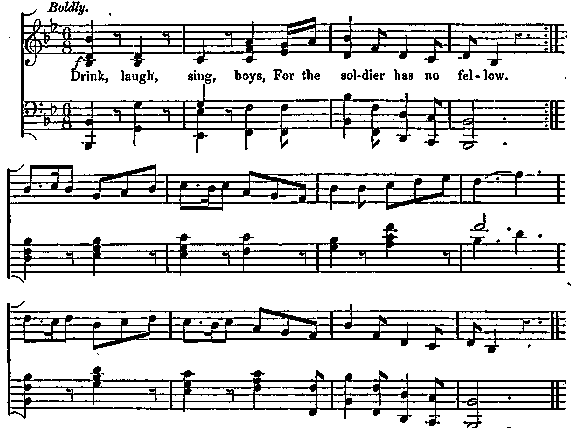Popular Music Of The Olden Time Vol 1
Ancient Songs, Ballads, & Dance Tunes, Sheet Music & Lyrics - online book
| Share page | Visit Us On FB |
|
|
||
|
344 ENGLISH SONG AND BALLAD MUSIC. - |
||
|
|
||
|
not at all like an Irish tune." In Scotland it has been claimed as The Deuks dang o'er my Daddie, and again disclaimed by Mr. George Farquhar Graham; editor of Wood's Songs of Scotland, who " freely confesses his belief that the air is not of Scottish origin." iii. 165.
All the oldest copies of Buff coat begin with three long notes, which seem to require corresponding monosyllables for the commencement of the words. The line I have quoted from The Knight of Malta suggests a commencement somewhat in the following manner :— |
||
|
|
||
 |
||
|
|
||
|
I should add, that in some copies of The Dancing Master the tune is in common time.
In later versions, where the long notes at the commencement are split into quavers (as in many of the ballad-operas), the bold character of the tune is lost, and it becomes rather a pretty than a spirited air. This change seems to be owing to the monosyllabic commencement having been discarded in the ballads which were written to it: as, for instance, in the following, from the Roxburghe Collection, i. 536:—" The merry Hostess; or—
A pretty new ditty, compos'd on an hostess that lives in the city. To wrong such an hostess it were a great pity, By reason she caused this pretty new ditty. To the tune of Buff coat has no fellow."
" Oome all that love good company, Who sells good ale,- nappy and stale,
And hearken to my ditty; And always thus sings she:
Tis of a lovely hostess fine, My ale was tnnn'd when I was young,
That lives in London city; And but little above my knee," &c.
The above is printed in Evans' Collection, i. 150 (1810). |
||
|
|
||